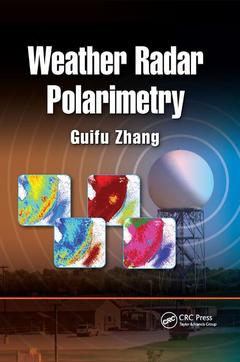Description
Weather Radar Polarimetry
Author: Zhang Guifu
Language: English
Subjects for Weather Radar Polarimetry:
Keywords
polarimetric; differential; reectivity; numerical; prediction; rain; rate; microphysical; parameters; Differential Reectivity; measurements; Polarimetric Radar; DR DR; Polarimetric Radar Measurements; Wave Scattering; Weather Radar; Reectivity Factor; Wave Eld; Polarimetric Variables; Radar Reectivity; DP DP; Stratiform Rain; Cos Sin Sin; Wave Propagation; Electromagnetic Wave; NWP Model; Ze Ni; Rain Rate; Hh Hv; Attenuation Correction; Scattering Amplitude; Membership Functions; Ground Clutter; Cost Function; Dielectric Constant
Publication date: 12-2019
· 15.6x23.4 cm · Paperback
Publication date: 07-2016
· 15.6x23.4 cm · Hardback
Description
/li>Contents
/li>Readership
/li>Biography
/li>
This book presents the fundamentals of polarimetric radar remote sensing through understanding wave scattering and propagation in geophysical media filled with hydrometers and other objects. The text characterizes the physical, statistical, and electromagnetic properties of hydrometers and establishes the relations between radar observables and physical state parameters. It introduces advanced remote sensing techniques (such as polarimetric phased array radar) and retrieval methods for physical parameters. The book also illustrates applications of polarimetric radar measurements in hydrometer classification, particle size distribution retrievals, microphysical parameterization, and weather quantification and forecast.
Introduction
Historical development
Objectives and organization of the book
Characterization of Hydrometeors
Physical and statistical properties
Electromagnetic properties
Wave Scattering by a Single Particle
Wave and electromagnetic wave
Scattering fundamentals
Rayleigh scattering
Mie scattering theory
Scattering calculations by a non-spherical particle
Scattering for arbitrary orientations
Scattering and Propagation in Cloud and Precipitation
Scattering models
Single scattering model
Coherent wave propagation
Propagation-included scattering
Radar Measurements and Improvement of Data Quality
Polarimetric weather radar system and equation
Regular estimation of polarimetric radar variables
Multi-lag correlation estimators
Clutter detection
Clutter mitigation
Applications in Weather Observation and Quantification
Observation of polarimetric radar signatures
Hydrometeor classification
Quantitative precipitation estimation (QPE)
Drop size distribution retrieval
Attenuation correction
Advanced Methods and Optimal Retrievals
Simultaneous attenuation correction and DSD retrieval
Statistical retrieval of rain DSDs
Variational retrieval
Optimal retrieval through data assimilation (DA)
Phased Array Radar Polarimetry
Background and challenges
Formulation for planar polarimetric phased array radar
Cylindrical polarimetric phased array radar
Guifu Zhang is Professor of Meteorology at University of Oklahoma School of Meteorology.




